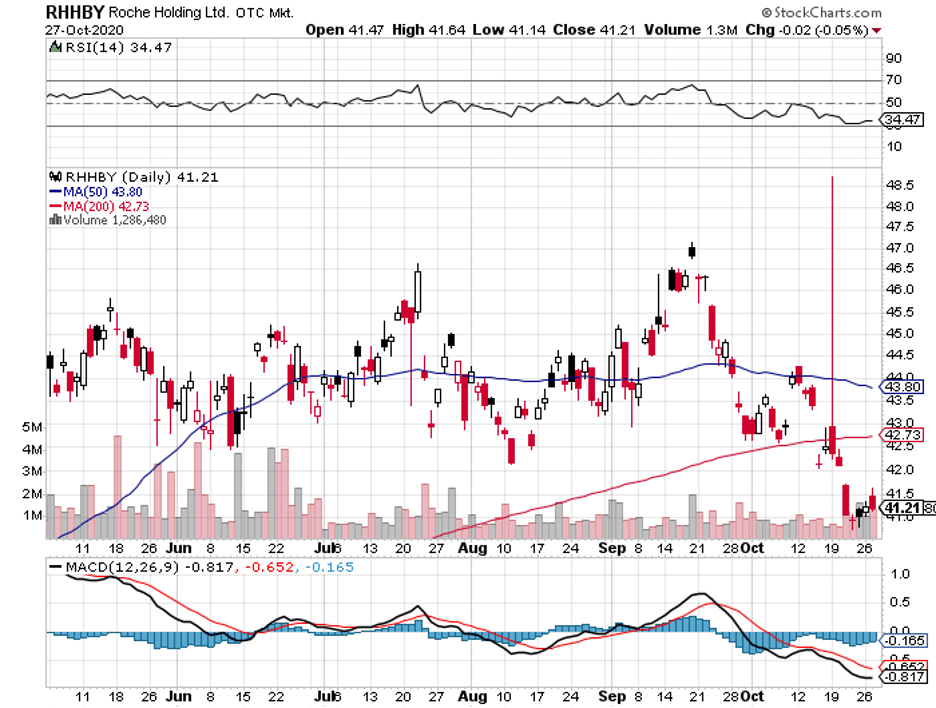Roche Enters COVID-19 Fight in Style
Roche (RHHBY) is making quite an entrance in the COVID-19 antiviral treatment race, forking out $350 million in cash to gain rest-of-the-world rights to a promising new drug created by Massachusetts-based biotech company Atea Pharmaceuticals.
This is an exciting development because the partnership between the two companies holds incredible promise in the search for a COVID-19 cure.
In May, Atea Pharmaceuticals essentially dropped all its projects and rebranded itself as a COVID-19 fighter, attracting a stunning $215 million in its venture round.
Among the marquee names that invested in this 7-year-old biotechnology company are Bain Capital and RA Capital.
Going back to its work with Roche, the $350 million cash is expected to fund the ongoing clinical trials of Atea’s very own COVID-19 antiviral treatment called AT-527.
So far, the candidate is in its Phase 2 trial and slated to start global trials or Phase 3 by early 2021.
Apart from being a potential COVID-19 treatment, AT-527 is also under development as a Hepatitis C medication.
In terms of where AT-527 stands in the COVID-19 treatment race, this drug belongs to the same class as Gilead Sciences’ (GILD) Remdesivir and Merck’s experimental candidate with Ridgeback Biotherapeutics called MK-4482.
Like Remdesivir and MK-4482, Roche’s AT-527 is designed to inhibit the replication of SARS-CoV-2, the virus that causes COVID-19.
Unlike Remdesivir though, which is only available through intravenous infusion, AT-527 is an oral drug, making it a more convenient option.
This isn’t the first time that Roche’s COVID-19 efforts came under the spotlight.
Earlier this month, its COVID-19 work with Regeneron (REGN), called REGN-COV2, has been dubbed as a leading candidate in the race because of the high-profile patient who used it: President Donald Trump.
This partnership with Regeneron is expected to ramp up the manufacturing process by at least 3 and a half times compared to their individual capacities.
Outside its COVID-19 efforts, Roche has proven to be a good long-term investment.
Admittedly, the company’s third-quarter report missed the mark by 4% due to aggressive biosimilar competition. However, Roche’s pipeline of newer products has been growing nicely.
Because of biosimilar competition, sales of cancer and immuno-oncology treatments like Avastin fell by 30%, Rituxan slipped by 33%, and Herceptin dropped by 38%.
However, the performance of Roche’s new drug lineup showed promising results, with sales of these products showing off a 32% growth in the third quarter of 2020.
For example, sales of multiple sclerosis drug Ocrevus rose by 37%, while revenue from cancer treatments like Perjeta climbed 17%, Kadycla rose by 33%, and Tecentriq jumped by 49%. Meanwhile, sales of hemophilia medication Hemlibra increased by 57% .
All in all, the hits and misses cancelled out each other this quarter.
Despite the disappointment in these results, Roche stood by its full fiscal year guidance.
This is a strong indicator that the company sees a brighter fourth quarter. Overall, Roche remains in good shape.
Tecentriq has been expanding to cater to other indications such as liver cancer and even some immuno-oncology applications.
Hemlibra continues to outperform its peers, holding on to 25% of the US market share for Hemophilia-A. Even Ocrevus has been outperforming others.
Regarding pipeline developments, Roche has been pouring resources for the trials of NASH drug candidate Crovalimab, which is now in Phase 3.
The acquisition of Inflazome in September and Enterprise Therapeutics in October indicate that Roche is looking to expand in the cystic fibrosis space as well.
Its recently inked agreement with Dyno Therapeutics also signals its plans to work on gene therapies, making itself a potential threat to the likes of biotechnology companies Alnylam (ALNY) and Ionis (IONS).
Looking at everything it has done and has yet to offer, I believe that Roche shares are undervalued at below the high $40s.
This company has a healthy lineup and promising R&D strategies combined with the capacity to buy high-potential assets.
I can see the company generating mid-single-digit cash flow growth on a long-term basis, and I even expect additional improvements to the dividend.
Given the returns you can get from Roche, I can say that this stock is very much worth consideration for any investor interested in quality growth.


